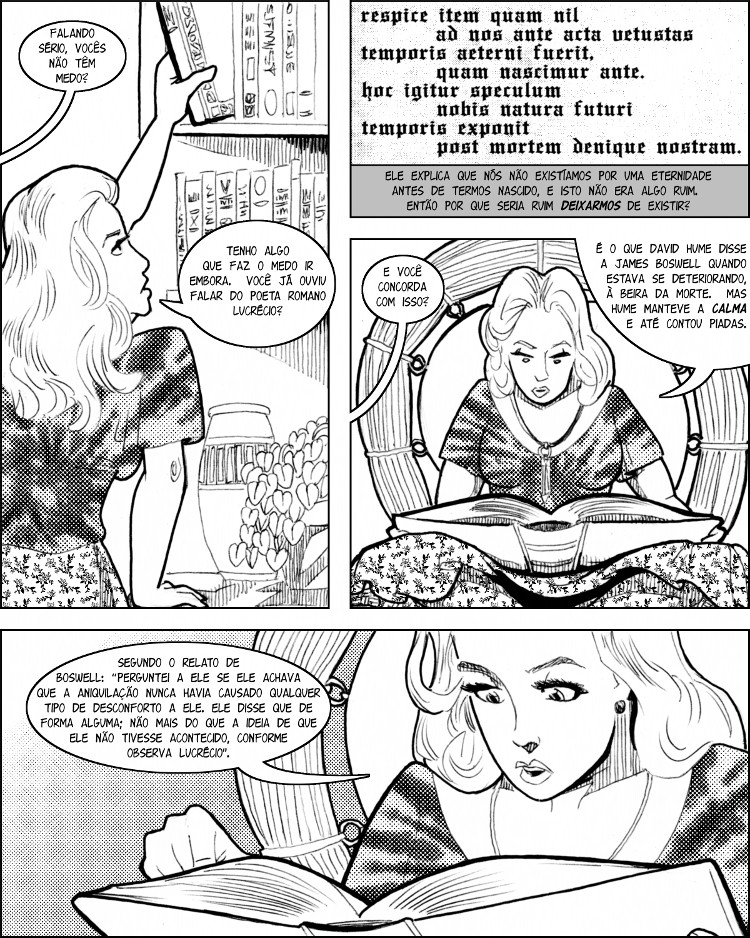
This work is licensed under a Creative Commons Attribution-NonCommercial-ShareAlike 4.0 International License.
PAGE 10 (Four panels)
Panel 1: Still in the same apartment where the interview is taking place, but Eliza is now on tiptoes taking a heavy book down from a a high shelf.
Unseen interviewer (1): Seriously, aren’t you afraid?
Translation (1): Falando sério, vocês não têm medo?
Eliza (2): I have something to make the fear go away. Have you heard of the Roman poet Lucretius?
Translation (2): Tenho algo que faz o medo ir embora. Você já ouviu falar do poeta romano Lucrécio?
Panel 2: Close-up around some text, the following lines from Lucretius’s De rerum natura, set in a very old typeface or (better if possible) as medieval manuscript: “respice item quam nil ad nos ante acta vetustas/temporis aeterni fuerit, quam nascimur ante./hoc igitur speculum nobis natura futuri/temporis exponit post mortem denique nostram.”
CAPTION – ELIZA NARRATING (3): He explains that we didn’t exist for an eternity before being born, and that wasn’t bad. So why should it be bad once we stop existing?
Translation (3): Ele explica que nós não existíamos por uma eternidade antes de termos nascido, e isto não era algo ruim. Então por que seria ruim deixarmos de existir?
Panel 3: Eliza, now sitting cross-legged in her big wicker chair. She has the large book she brought down in Panel 1 resting open on her lap. She’s pointing down at something on a page.
Unseen interviewer (4): And you buy that?
Comment (4): “And you buy that?” is an idiom in American English, the literal meaning of which is “Do you really believe that?”
Translation (4): Unseen interviewer (4): E você concorda com isso?
Eliza (5): It’s what David Hume told James Boswell as Hume was wasting away, about to die. But Hume was calm and even told jokes.
Translation (5): É o que David Hume disse a James Boswell quando estava se deteriorando, à beira da morte. Mas Hume manteve a calma e até contou piadas.
Panel 4: Eliza looking down at the page of the book open on her lap, reading.
Eliza (6): From Boswell’s account: “I asked him if the thought of annihilation never gave him any uneasiness. He said not the least; no more than the thought that he had not been, as Lucretius observes.”
Comment (6): Eliza is quoting from a real literary work, James Bosewell’s Life of Johnson. If there is a public domain version of the Life in your target language, you are encouraged to substitute its text for your own translation.
Translation (6): Segundo o relato de Boswell: “Perguntei a ele se ele achava que a aniquilação nunca havia causado qualquer tipo de desconforto a ele. Ele disse que de forma alguma; não mais do que a ideia de que ele não tivesse acontecido, conforme observa Lucrécio”.
![]()
![]() A Isca (Português/Versão em página longa)
A Isca (Português/Versão em página longa)
A Isca (Português/Versão em carrossel)

